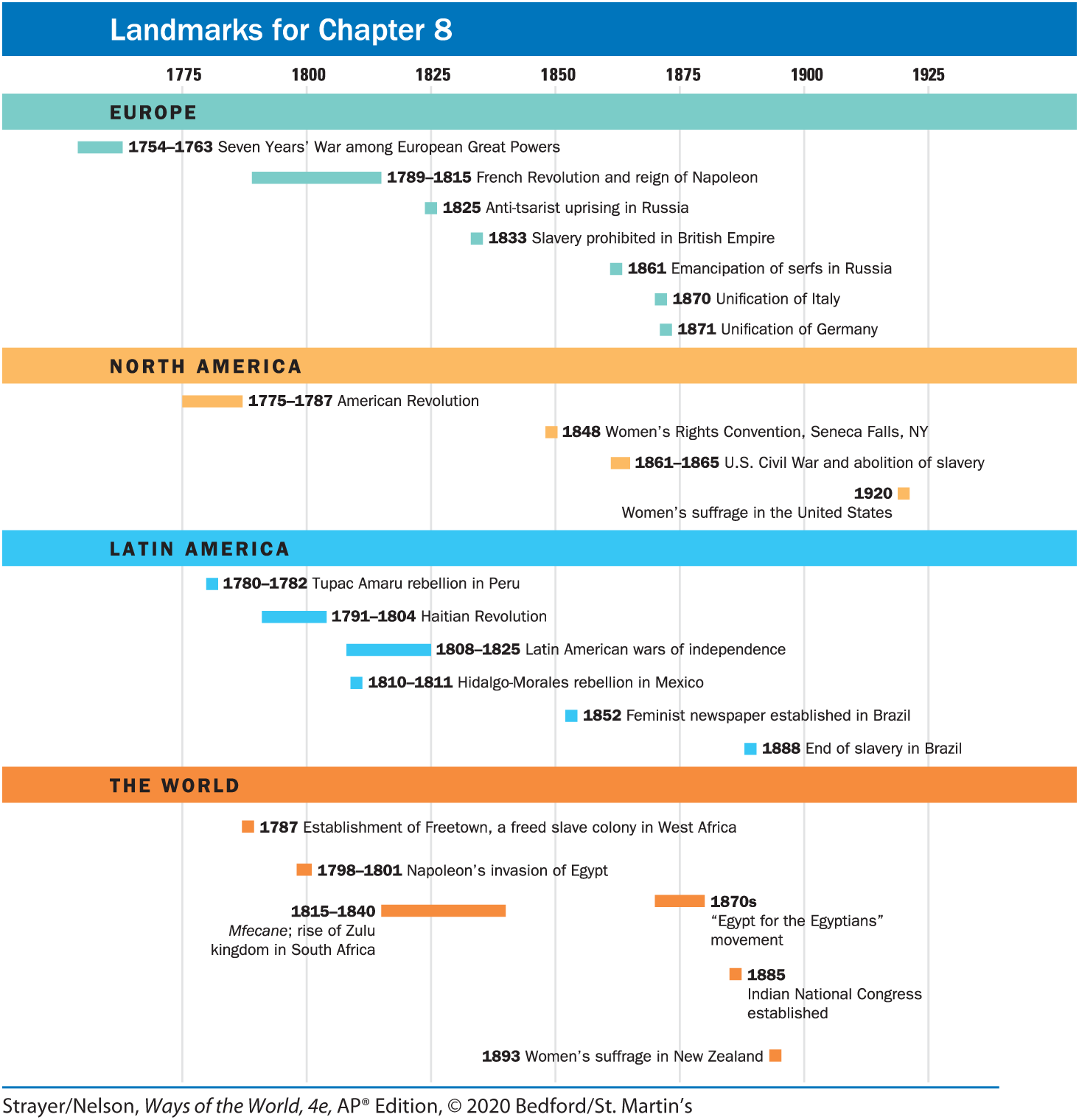Chapter 8.1 Intro to Political Revolutions
Context of Global Upheavals (1730s-19th Century):
Safavid Collapse: By the 1730s, the Safavid Empire in Persia had disintegrated under pressure from Afghan invaders and internal strife, leaving a vacuum that intensified regional conflicts and power struggles.
Mughal Fragmentation: Concurrently, the Mughal Empire in India was losing coherence; regional powers like the Marathas, Sikhs, and various princely states began asserting greater autonomy, leading to a patchwork of competing domains.
Wahhabi Challenge: The Wahhabi movement, emerging in the 18th century, posed a significant ideological and military challenge to the Ottoman Empire. Its call for a return to purer forms of Islam influenced uprisings and inspired reforms beyond Arabia, affecting Islamic practices in Central Asia.
Russian Peasant Rebellions: Notably, the Pugachev Rebellion (1773-1774) was a direct response to oppressive serfdom and autocratic rule under Catherine the Great. It briefly succeeded in uniting diverse ethnic groups before brutal suppression.
Distinctive Features of Atlantic Revolutions:
Financial Strains from Global Wars: Specifically, the Seven Years’ War put immense financial burdens on Britain and France, leading to increased taxation in North American colonies and France, catalyzing revolutionary sentiments due to perceived injustices.
Interconnected Revolutions: Figures like Thomas Jefferson and Simón Bolívar not only participated in their national revolutions but also influenced other revolutions. Jefferson, while in France, engaged with French revolutionaries, spreading American revolutionary ideas, and Bolívar received crucial support from Haiti for his campaigns in South America.
Enlightenment Ideals: The revolutions were steeped in Enlightenment thought, challenging old regimes and advocating new political philosophies centered on liberty, equality, and the sovereignty of the people over divine or hereditary rule.
Global Impact and Legacy:
Ideological Exchange and Print Media: The proliferation of print media allowed for rapid dissemination of revolutionary ideas. Newspapers, pamphlets, and books discussing Enlightenment and revolutionary ideas circulated widely across the Atlantic, knitting together a transcontinental web of intellectual exchange.
Influence on Subsequent Movements: These revolutionary ideas directly influenced the 19th-century movements for abolition, suffrage, and constitutional reforms worldwide. The principles articulated during the Atlantic Revolutions became blueprints for activists and reformers globally.
Formulation of Modern Ideologies and Nationalism: The revolutions fueled the rise of nationalism, fundamentally reshaping the political landscapes of Europe and the Americas. Nationalism emerged as a powerful ideology that would later drive the unifications of Germany and Italy and the independence movements in the Balkans and colonies worldwide.
Human Rights Developments: The Universal Declaration of Human Rights adopted by the United Nations in 1948 can trace its philosophical roots back to the ideals of the Atlantic Revolutions. These principles have continued to inspire global human rights movements, including the Arab Spring and various democratic movements around the world.
Cultural and Intellectual Exchange: The Atlantic basin became a fertile ground for the exchange of revolutionary ideas, largely facilitated by the proliferation of print media.
Widespread Influence on Social Movements: The principles of these revolutions later influenced global movements aimed at abolishing slavery, extending voting rights, crafting constitutions, and promoting gender equality.
Formation of Modern Ideologies: Nationalism, deeply influenced by these revolutions, became a defining force of the 19th and 20th centuries. These ideologies also paved the way for the feminist, socialist, and communist movements.
Human Rights Legacy: The ideals from these revolutions were echoed in the Universal Declaration of Human Rights in 1948, which has since underpinned numerous international efforts against oppression and tyranny.
AP Question:
How did the ideas of the Enlightenment contribute to the Atlantic revolutions?
Popular Sovereignty: Enlightenment thinkers advocated that the authority to govern should derive from the people rather than from divine right or hereditary status. This idea influenced revolutionary movements to challenge existing monarchies and seek self-governance.
Equality and Liberty: Central to Enlightenment thought were the concepts of liberty and equality. Philosophers like John Locke argued for natural rights to life, liberty, and property, which encouraged the revolutionary rhetoric and actions seen in the American Declaration of Independence and the French Declaration of the Rights of Man and of the Citizen.
Rationalism and Questioning Authority: Enlightenment thinkers promoted the use of reason as the best method of learning truth. This encouraged a critical approach towards traditional institutions, including the church and the monarchy, leading to questioning and ultimately challenging their authority.
Secular Governance: The Enlightenment's push for rational and empirical standards in governance led to the secularization of political institutions, diminishing the role of religious authority in governance, evident in the revolutionary constitutions and laws that emerged.
Social Contract: Philosophers like Rousseau and Locke proposed that governments are based on a contract between the governed and those who govern. If rulers fail to protect the rights and interests of the people, the people have the right to replace their government. This directly influenced revolutionary actions across the Atlantic.

/